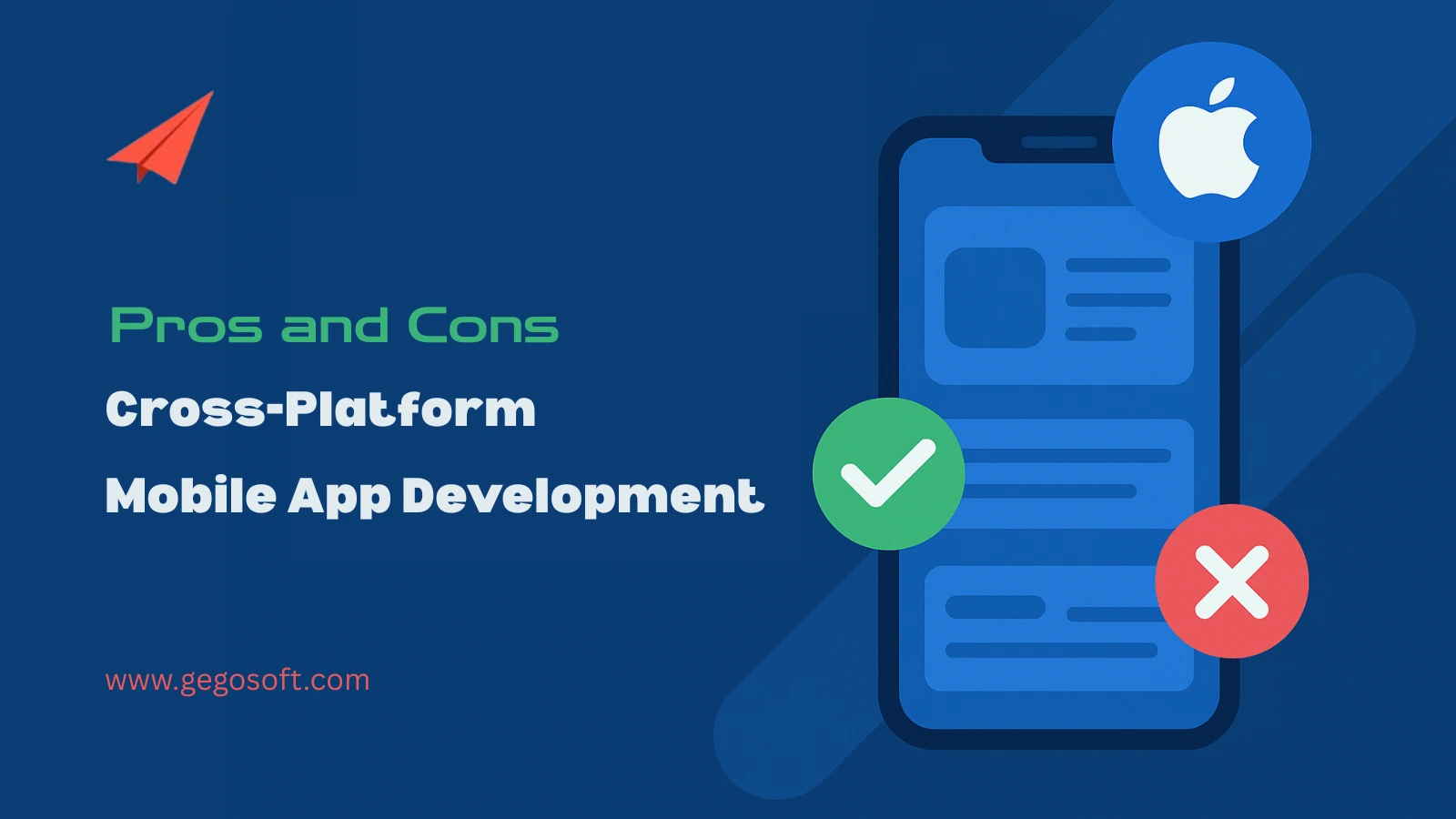In today’s mobile-first world, businesses aiming for digital dominance often face a pivotal choice: whether to go native or cross-platform for mobile app development. At GegoSoft Technologies, we help brands make informed decisions by providing expert insights into each approach. Cross-platform mobile app development has emerged as a powerful solution for startups and enterprises alike, offering flexibility and cost-efficiency. But like any strategy, it comes with its own advantages and drawbacks.
Below, we provide a comprehensive, SEO-rich breakdown of the pros and cons of cross-platform mobile app development, covering everything businesses need to know before making an investment.
What Is Cross-Platform Mobile App Development?
Cross-platform mobile app development refers to the creation of mobile applications that can run on multiple operating systems—typically iOS and Android—using a single codebase. Popular frameworks enabling this are Flutter, React Native, Xamarin, and Ionic. These tools help developers write code once and deploy it across different platforms, saving time and resources.
Pros of Cross-Platform Mobile App Development
1. Faster Time to Market
Developing separate apps for iOS and Android requires more time and coordination. With cross-platform tools, you build once and launch simultaneously on both platforms, accelerating your go-to-market strategy and ensuring faster reach to users across devices.
2. Cost-Effective Development
Hiring two separate teams for Android and iOS can double your development budget. Cross-platform mobile development reduces costs significantly, as one team using a shared codebase can manage both platforms efficiently. This makes it a preferred choice for startups and businesses with tight budgets.
3. Unified User Experience
Cross-platform frameworks are mature enough to provide consistent UI/UX across devices, ensuring your brand identity stays uniform. Whether it’s layout, colors, or navigation, a unified experience enhances user satisfaction and engagement.
4. Easier Maintenance and Updates
When an update or bug fix is required, it only needs to be applied once to the shared codebase, rather than twice (once for each platform). This simplifies maintenance and reduces ongoing costs, making your app more agile and scalable.
5. Wide Market Reach
With a single app serving both iOS and Android users, you tap into a larger audience pool. This wide reach is crucial for apps with monetization models like ads or subscriptions, maximizing revenue opportunities from the start.
6. Reusable Codebase and Components
Frameworks like React Native allow developers to reuse components, libraries, and business logic across platforms. This reusability enhances productivity, reduces duplication of efforts, and helps maintain code consistency.
Cons of Cross-Platform Mobile App Development
1. Performance Limitations
Despite advancements, cross-platform apps may lag behind native apps in terms of speed and performance, especially for graphics-intensive applications like games or real-time apps. Native code still has an edge in optimizing device-specific features.
2. Limited Access to Native APIs
Although frameworks try to bridge the gap, there are times when accessing specific native features like sensors, Bluetooth, or camera APIs can be challenging or limited. Developers may need to write custom native modules, increasing complexity.
3. UI/UX Differences Across Platforms
Designing a UI that perfectly mimics native elements on both platforms can be difficult. Small inconsistencies in user experience might arise, especially with complex interactions or animations. Native apps usually offer more refined and platform-specific designs.
4. Dependency on Framework and Tools
Relying heavily on third-party frameworks means you’re at the mercy of their updates, community support, and future compatibility. If a framework is deprecated or lacks proper documentation, it could introduce long-term technical debt.
5. Security Concerns
Because cross-platform apps use abstract layers and shared code, ensuring top-tier security across platforms can be more difficult. Sensitive data transmission and storage must be handled with utmost care, often requiring platform-specific tweaks.
Best Use Cases for Cross-Platform Mobile App Development
At GegoSoft Technologies, we recommend cross-platform development for:
-
MVPs (Minimum Viable Products) that need fast testing and validation
-
Content-based apps like blogs, news, or eCommerce platforms
-
Enterprise apps where internal tools need to be shared across devices
-
Startups looking for quick and cost-effective solutions
Popular Cross-Platform Development Frameworks
Flutter (by Google)
A favorite among developers for its hot reload feature, expressive UI, and growing community. It uses Dart language and is particularly good for high-performance apps.
React Native (by Meta)
Highly popular due to JavaScript support and native rendering. It’s backed by a huge community and is ideal for apps with complex UI.
Xamarin (by Microsoft)
A C# based framework with powerful tools and integration with the .NET ecosystem. It’s great for apps that require deep native functionality.
Ionic
Built on web technologies like HTML, CSS, and JavaScript. It’s perfect for web developers transitioning into mobile development, offering a hybrid solution that works well for basic apps.
How GegoSoft Technologies Empowers Cross-Platform Success
At GegoSoft Technologies, our expert developers help you navigate the technical landscape of cross-platform mobile app development with precision. From choosing the right framework to launching and scaling your app, we offer:
-
Custom mobile app development
-
End-to-end project consultation
-
UI/UX design tailored for both platforms
-
App testing, deployment, and support
-
Security audits and performance optimization
With a strong track record in delivering scalable, secure, and high-performing mobile solutions, GegoSoft Technologies is your trusted partner in mobile app success.
Final Thoughts: Is Cross-Platform Mobile App Development Right for You?
Choosing the right development approach depends on your business goals, budget, and technical needs. Cross-platform mobile app development is a compelling choice for many businesses seeking faster delivery and broader reach without compromising quality.
If you need help evaluating whether this approach fits your project, GegoSoft Technologies is here to guide you with insights and hands-on support.

